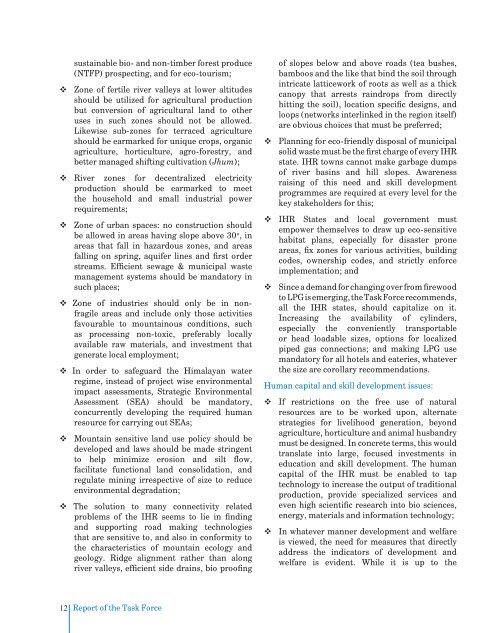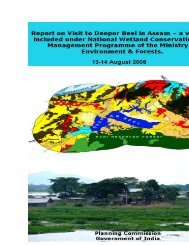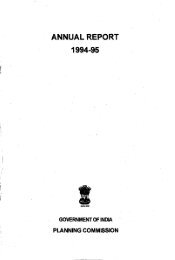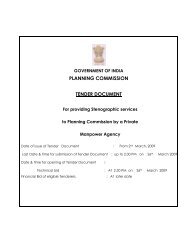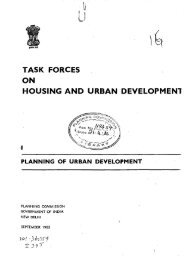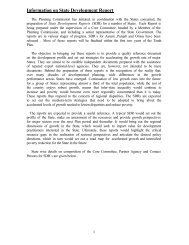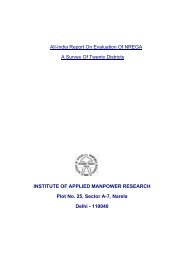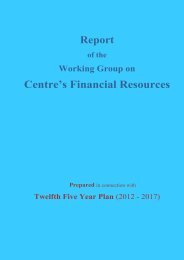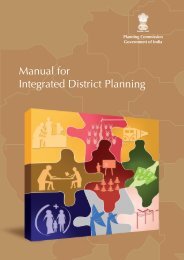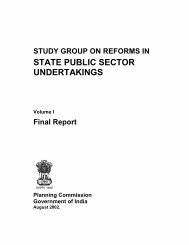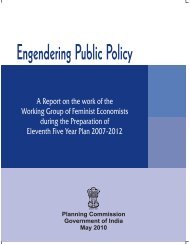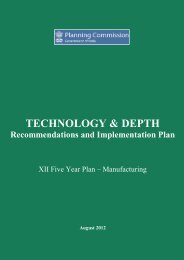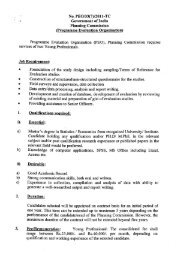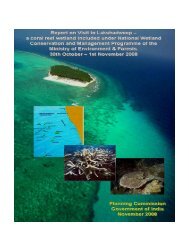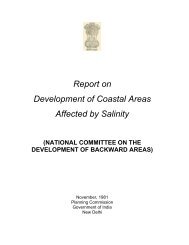Task Force Report - Govind Ballabh Pant Institute of Himalayan ...
Task Force Report - Govind Ballabh Pant Institute of Himalayan ...
Task Force Report - Govind Ballabh Pant Institute of Himalayan ...
You also want an ePaper? Increase the reach of your titles
YUMPU automatically turns print PDFs into web optimized ePapers that Google loves.
sustainable bio- and non-timber forest produce<br />
(NTFP) prospecting, and for eco-tourism;<br />
Zone <strong>of</strong> fertile river valleys at lower altitudes<br />
should be utilized for agricultural production<br />
but conversion <strong>of</strong> agricultural land to other<br />
uses in such zones should not be allowed.<br />
Likewise sub-zones for terraced agriculture<br />
should be earmarked for unique crops, organic<br />
agriculture, horticulture, agro-forestry, and<br />
better managed shifting cultivation (Jhum);<br />
River zones for decentralized electricity<br />
production should be earmarked to meet<br />
the household and small industrial power<br />
requirements;<br />
Zone <strong>of</strong> urban spaces: no construction should<br />
be allowed in areas having slope above 30 o , in<br />
areas that fall in hazardous zones, and areas<br />
falling on spring, aquifer lines and first order<br />
streams. Efficient sewage & municipal waste<br />
management systems should be mandatory in<br />
such places;<br />
Zone <strong>of</strong> industries should only be in nonfragile<br />
areas and include only those activities<br />
favourable to mountainous conditions, such<br />
as processing non-toxic, preferably locally<br />
available raw materials, and investment that<br />
generate local employment;<br />
In order to safeguard the <strong>Himalayan</strong> water<br />
regime, instead <strong>of</strong> project wise environmental<br />
impact assessments, Strategic Environmental<br />
Assessment (SEA) should be mandatory,<br />
concurrently developing the required human<br />
resource for carrying out SEAs;<br />
Mountain sensitive land use policy should be<br />
developed and laws should be made stringent<br />
to help minimize erosion and silt flow,<br />
facilitate functional land consolidation, and<br />
regulate mining irrespective <strong>of</strong> size to reduce<br />
environmental degradation;<br />
The solution to many connectivity related<br />
problems <strong>of</strong> the IHR seems to lie in finding<br />
and supporting road making technologies<br />
that are sensitive to, and also in conformity to<br />
the characteristics <strong>of</strong> mountain ecology and<br />
geology. Ridge alignment rather than along<br />
river valleys, efficient side drains, bio pro<strong>of</strong>ing<br />
<strong>of</strong> slopes below and above roads (tea bushes,<br />
bamboos and the like that bind the soil through<br />
intricate latticework <strong>of</strong> roots as well as a thick<br />
canopy that arrests raindrops from directly<br />
hitting the soil), location specific designs, and<br />
loops (networks interlinked in the region itself)<br />
are obvious choices that must be preferred;<br />
Planning for eco-friendly disposal <strong>of</strong> municipal<br />
solid waste must be the first charge <strong>of</strong> every IHR<br />
state. IHR towns cannot make garbage dumps<br />
<strong>of</strong> river basins and hill slopes. Awareness<br />
raising <strong>of</strong> this need and skill development<br />
programmes are required at every level for the<br />
key stakeholders for this;<br />
IHR States and local government must<br />
empower themselves to draw up eco-sensitive<br />
habitat plans, especially for disaster prone<br />
areas, fix zones for various activities, building<br />
codes, ownership codes, and strictly enforce<br />
implementation; and<br />
Since a demand for changing over from firewood<br />
to LPG is emerging, the <strong>Task</strong> <strong>Force</strong> recommends,<br />
all the IHR states, should capitalize on it.<br />
Increasing the availability <strong>of</strong> cylinders,<br />
especially the conveniently transportable<br />
or head loadable sizes, options for localized<br />
piped gas connections; and making LPG use<br />
mandatory for all hotels and eateries, whatever<br />
the size are corollary recommendations.<br />
Human capital and skill development issues:<br />
If restrictions on the free use <strong>of</strong> natural<br />
resources are to be worked upon, alternate<br />
strategies for livelihood generation, beyond<br />
agriculture, horticulture and animal husbandry<br />
must be designed. In concrete terms, this would<br />
translate into large, focused investments in<br />
education and skill development. The human<br />
capital <strong>of</strong> the IHR must be enabled to tap<br />
technology to increase the output <strong>of</strong> traditional<br />
production, provide specialized services and<br />
even high scientific research into bio sciences,<br />
energy, materials and information technology;<br />
In whatever manner development and welfare<br />
is viewed, the need for measures that directly<br />
address the indicators <strong>of</strong> development and<br />
welfare is evident. While it is up to the<br />
12<br />
<strong>Report</strong> <strong>of</strong> the <strong>Task</strong> <strong>Force</strong>


